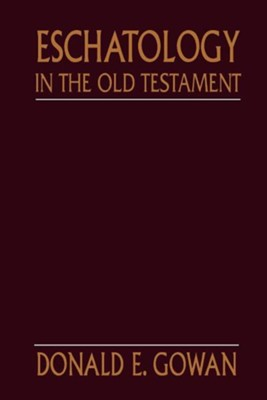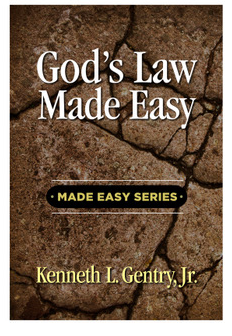COMPREHENSIVE HOPE IN ESCHATOLOGY
PMW 2025-024 by Donald E. Gowan
Gentry note:
The following is a series of thoughts selected from a very helpful book by Gowan on Eschatology on the Old Testament (pp. 122 ff.). Though he is not writing as a postmillennialist, he has many helpful observations that this article will share. His book basically argues for a holistic concept of redemption, both man (body and soul) and the broader creation (new heavens and new earth). He is not a conservative evangelical (as far as I can tell), but he is a good scholar insightful analyses of important eschatological issues.
Gowan’s Observations
The OT’s expectations and longings are distinct from those to be found in other religions and cultures. Thereby they offer a challenge for alternative forms of hope — Christian and otherwise — and insight into the nature of the eschatologies of the Western world.
1. Old Testament eschatology is a worldly hope. The OT does not scorn, ignore, or abandon the kind of life which human beings experience in this world in favor of speculation concerning some other, better place or form of existence, to be hoped for after death or achieved before death through meditation and spiritual exercises. This sets the OT in sharp contrast to Gnosticism, to the otherworldly emphases that often have appeared in Christianity, and to the concepts of salvation taught by Hinduism and Buddhism. Whether it is better and truer than those other forms of hope, or is just irredeemably “unspiritual,” remains, of course, a matter for faith to decide. But this quality of the OT hope surely ought to commend its outlook to an age that is equally worldly in its concerns.
2. Old Testament eschatology understands the future to be completely in the hands of God. Having just spoken of contemporary “worldliness,” which might be equated with secularism, this point must be made in order to remind ourselves that there are other ways to be worldly. The basis for hope in the OT is not faith in human progress, but the assurance of a coming divine intervention that will introduce a new thing that people have failed and will fail to accomplish. We have seen throughout that the hope of Israel was not an expression of faith in the essential goodness of humanity. Instead, it grew out of the conviction that human failure has so corrupted life on this earth that only a radical transformation initiated by God alone could make things right. This point of view thus stands in sharp contrast to modern humanism and to all “self-help” projections of the future.

Greatness of the Great Commission (by Ken Gentry)
An insightful analysis of the full implications of the great commission as given in Matthew 28:18-20. Impacts postmillennialism as well as the whole Christian worldview.
See more study materials at: www.KennethGentry.com
It does not, however, call for a completely passive drift into the divinely wrought paradise. The OT puts a strong emphasis on human participation in one way or another. Repentance, for example, is seen as essential, at some point in the process. The emphasis on obedience in the OT portraits of the ideal future shows that at no time does the OT conceive of human beings without responsibility. They participate actively in the new world, but they cannot produce it; that will be God’s work.
3. Old Testament eschatology emphasizes human society more than personal salvation. This stands in contrast to a strong emphasis in Christian teaching and to modern individualism as well. We have noticed that concern for the fate of the individual after death, which has tended to dominate Christian eschatology, is almost completely missing from the OT…. Certainly the OT does not ignore the redemption of individuals, but it puts its strongest emphasis on the truth that full human life is life in community. Already some who are seeking to respond theologically to the futurists’ identification of our root problem as selfishness have appealed to this biblical outlook. It would seem that it has still more to offer to those who are striving to find incentives to move people toward action that will improve our life together on a global scale.
4. Old Testament eschatology is a comprehensive hope. The OT neither focuses on an improved social structure inhabited by the same kind of people who created the mess we are now in; nor does it promise that personal salvation will somehow make social problems go away; neither does it imagine that a healthy human society can exist without a wholesome interaction with the natural world. I have already made brief comments on the potential ethical values of OT eschatology, and I wish to expand that subject now.
An Eschatological Ethic
Until recently, theological scholarship has tended to see eschatology as irrelevant for ethics if not actually working contrary to the concern for making human life better in this world. It seemed to divert one’s attention to heaven and the after-life and thus to be a very narrowly confined area of Christian thought. Carl Braaten, who has called eschatology “the key to Christian ethics,” has also had to admit that most contemporary ethicists completely ignore the subject, but there may be some signs of change. What theology is learning from the futurists concerning the intimate relationship between hope and action is likely to make a significant effect, and historical studies are also beginning to reveal that in practice eschatology often has had a powerful ethical component….
God’s Law Made Eas y
y
(by Kenneth Gentry)
Summary for the case for the continuing relevance of God’s Law. A helpful summary of the argument from Greg L. Bahnsen’s Theonomy in Christian Ethics.
See more study materials at: www.KennethGentry.com
Two aspects of the ethical implications of eschatology may be identified and designated as the object and the impetus. By object is meant what eschatology says human beings can and should be doing in the world, and by impetus is meant why eschatology impels us to want to do something about the present world. The object has been a topic for continual debate; this is what has made eschatology ethically dubious for many theologians. Is it possible to define some legitimate eschatologically motivated object for ethical action, that is, one that takes the eschaton to be truly future and completely the work of God, yet sees implications in this for human behavior in the present? At this point we recall Braaten’s definition of eschatological ethics: “it is the truly future eschatological kingdom of God-which has achieved a present impact in the person of Jesus and wherever the word of his presence exercises its creative power,” and then add to it something drawn from the understandings offered in this book. Anything that is truly future is inaccessible to any human being except as hope, but since the Bible’s central concern in speaking of the future is not time but evil, a limited participation in the eschaton as the end of evil is possible now, since God’s redemptive work is already in process. It is not yet the end, of time or of evil, but in faith we believe that we do participate in events and experience conditions that already possess something of the quality of the eschaton.
 Understanding the Creation Account
Understanding the Creation Account
DVD set by Ken Gentry
Formal conference lectures presenting important information for properly approaching the Creation Account in Genesis. Presents and defends Six-day Creation exegesis, while presenting and rebutting the Framework Hypothesis.
See more study materials at: www.KennethGentry.com
This approach may help to support the affirmations of some recent writers that the objects of eschatological ethics are to provide signs of the proleptic presence of God’s future.’ As Braaten says, they are annunciation and anticipation. We do not expect, then, to create the kingdom of God-within our Christian community as the Shakers did or in society at large as the Social Gospel did-but we believe it is possible for us to do some things that are indeed in correspondence with our understanding of what God is working toward. They will be witnesses to the truth of the future hope, reminders to believers, and perhaps also to others of what God is doing. What we do in an effort to make our behavior correspond with the way we believe the world day thus serves a dual purpose. On the one hand, we do some good things for other people. Where there is injustice, poverty, and illness, we do what we can to make things better for those people. Of course, eschatology is not the only incentive for such behavior; it is only one of several. But it makes a special contribution when we fail, as we regularly do. We never quite succeed in making things completely right, and sometimes we are complete failures. When that happens, in addition to the assurance of forgiveness there stands another assurance, that the future does not depend ultimately on us but on God. Whether we succeed or fail, our every effort to make things right is, therefore, a witness to the world that God is at work to Every little victory over evil is thus a reminder that the ultimate victory is bring about, someday, a time without suffering and anguish for everyone. Every little victory over evil is thus a reminder that the ultimate victory is coming….
How then does one live today, one who seriously affirms such hopes for God’s future? Would one even consider doing anything that is contrary to, or at cross-purposes with, or even neutral with respect to, what one’s eschatology affirms to be the ultimate purpose of God? Surely only hypocrisy or a definition of eschatology which the Bible will scarcely permit will allow that. For the biblical hope does not imply that in the meantime, before the last days arrive, God is neutral, just waiting for the time to come when he will intervene to make things right. God assures us that he is at work now and that what he is doing now is fully consistent with what will happen in that day. This is the obligation created by eschatology: to do our best to avoid doing anything contrary to what God is doing, and to be directed in our actions by our understanding of the direction of God’s work.
The attraction of eschatology is its most potent aspect, that which makes it ethically most dangerous or most helpful. It is a vision, a dream, and the power of dreams far surpasses any sense of obligation. It is sometimes merely a daydream about which we feel no need to do anything, but it need not be that. It is often the kind of dream which pulls us toward it, about which we cannot remain idle. Hope for the future is one of the strongest motivating forces to which we are subject, and since demagogues know that, some of them become highly skilled in using it. All the more reason for those who are committed to the biblical faith to recognize hope’s power and learn to use it for good.
GOODBIRTH AND THE TWO AGES
I am currently researching a technical study on the concept of the Two Ages in Scripture. This study is not only important for understanding the proper biblical concept of the structure of redemptive history. But it is also absolutely essential for fully grasping the significance of the Disciples’ questions in Matthew 24:3, which spark the Olivet Discourse. This book will be the forerunner to a fuller commentary on the Olivet Discourse in Matthew’s comprehensive presentation. This issue must be dealt with before one can seriously delve into the Discourse itself.
If you would like to support me in my research, I invite you to consider giving a tax-deductible contribution to my research and writing ministry: GoodBirth Ministries. Your help is much appreciated! https://www.paypal.com/donate/?cmd=_s-xclick&hosted_button_id=4XXFLGKEQU48C&ssrt=1740411591428
Kenneth L. Gentry Jr.'s Blog
- Kenneth L. Gentry Jr.'s profile
- 85 followers



